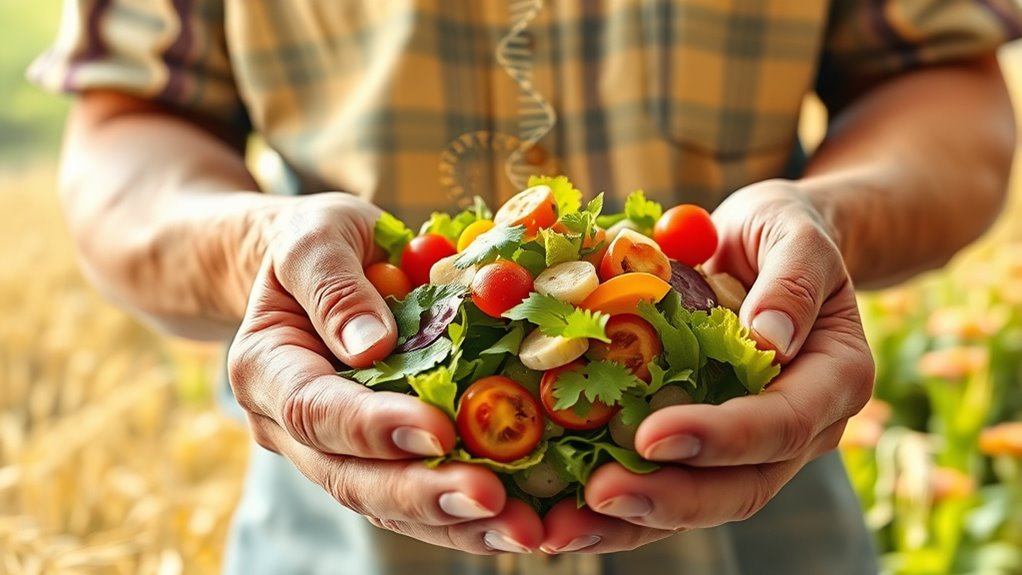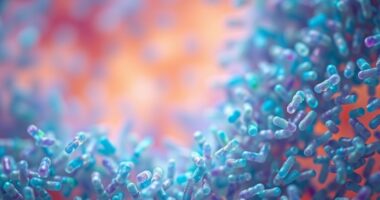Epigenetics shows how your grandparents’ diets can influence your health by changing how your genes turn on or off across generations. Unhealthy eating or high stress may leave molecular marks on DNA, increasing your risk for conditions like obesity or diabetes. These epigenetic changes can be inherited but are also reversible through lifestyle choices. To discover more about how your family’s past affects your future, keep exploring these fascinating connections.
Key Takeaways
- Epigenetics involves modifications that regulate gene activity without altering DNA, influenced by environmental factors like diet.
- Grandparents’ poor nutrition can cause epigenetic changes passed down to grandchildren, affecting their health risks.
- These inherited epigenetic marks can influence metabolism, stress response, and disease susceptibility across generations.
- Lifestyle choices, including diet, can reverse or modify epigenetic patterns, impacting descendants’ gene expression.
- Ancestral dietary habits can predispose future generations to conditions like obesity, diabetes, and cardiovascular diseases.

Your grandparents’ diet can influence your health in ways you might not expect, thanks to the science of epigenetics. This field explains how your genetic inheritance isn’t just about the DNA you’re born with but also how environmental factors, like diet, can modify gene expression across generations. When your grandparents eat certain foods or follow specific lifestyles, these choices can leave molecular marks on their DNA, which can be passed down to you. These marks don’t alter the genetic code itself but influence how genes turn on or off, affecting your health outcomes even before you’re born.
Your grandparents’ lifestyle can epigenetically shape your health before birth.
This process is rooted in the concept of lifestyle impacts. For example, if your grandparents experienced poor nutrition or high-stress living conditions, their bodies might have responded by epigenetically altering gene activity related to metabolism, stress response, or disease susceptibility. These changes can be inherited, meaning they don’t disappear after a single generation but can persist and influence your health. Conversely, healthy dietary choices made by your grandparents might have protective effects, helping to regulate gene expression in a way that lowers your risk for certain conditions.
Research in epigenetics shows that these molecular modifications can be reversible and influenced by your current lifestyle, providing hope for positive change. Understanding this connection helps clarify why some individuals develop health issues despite having a healthy lifestyle themselves. It’s not just about your current habits but also about the epigenetic legacy passed down from your ancestors. For example, if your grandparents’ diets were rich in processed foods or lacked essential nutrients, this could have set off epigenetic changes that make you more prone to obesity, diabetes, or cardiovascular disease. On the other hand, their consumption of nutrient-dense foods might have fostered beneficial epigenetic modifications that protect you from certain illnesses.
The exciting part about epigenetics is that lifestyle impacts aren’t limited to just one generation. They can ripple through families, demonstrating that your health is partly shaped by the dietary and environmental exposures of your ancestors. This means that by making mindful dietary choices today, you can potentially influence your gene expression in a way that benefits future generations. Essentially, the way your grandparents ate and lived doesn’t just affect them; it can set the stage for your own health and well-being, illustrating a powerful link between genetics, lifestyle impacts, and intergenerational health.
Frequently Asked Questions
Can Epigenetic Changes Be Passed Through Multiple Generations?
You might wonder if epigenetic changes can pass through generations. Yes, transgenerational inheritance allows epigenetic memory to be retained beyond a single generation. This means environmental factors, like your grandparents’ diet, can influence your gene expression indirectly. These modifications can be preserved in reproductive cells, affecting your health and traits. So, epigenetics provides a way for experiences to echo across generations, shaping your biology in ways you might not realize.
Does Grandparental Diet Influence Grandchildren’S Health More Than Parents’?
You might wonder if your grandparents’ diet impacts your health more than your parents’ do. Epigenetics shows that genetic inheritance includes not just DNA, but also environmental influences like diet. Your grandparents’ lifestyle modifications can leave epigenetic marks that influence your health across generations. While your parents’ habits matter, your grandparents’ diet can have a profound, lasting effect, highlighting the importance of early lifestyle choices and their potential to shape future generations.
Are Epigenetic Effects Reversible With Lifestyle Changes?
Epigenetic effects are indeed reversible with lifestyle modification, thanks to genetic flexibility. When you adopt healthier habits like proper diet, regular exercise, and stress management, you can influence your gene expression positively. These changes may reduce or even reverse some inherited epigenetic marks. So, by making conscious choices, you actively shape your health, demonstrating that your lifestyle plays a vital role in modifying your genetic potential.
How Quickly Can Dietary Changes Impact Epigenetic Markers?
You might think epigenetic changes take years, but the speed of epigenetic change varies with your lifestyle. When you adopt a healthier diet, some epigenetic markers can shift within days or weeks, showing a rapid dietary impact timeline. While not all changes are immediate, consistent healthy choices can influence gene expression quickly, proving that your diet has a real and timely effect on your biology.
Do Specific Foods Have Stronger Epigenetic Effects Than Others?
You wonder if some foods have stronger epigenetic effects than others. Food specificity plays a role here, as certain nutrients and bioactive compounds exhibit higher epigenetic potency. For example, foods rich in folate, methyl donors, or polyphenols often influence gene expression more markedly. While all nutritious foods support health, some have a more profound impact on your epigenome, shaping your biological responses and potential health outcomes.
Conclusion
As you walk through the garden of life, remember that your grandparents’ choices planted seeds in your DNA’s soil. These tiny, invisible patterns influence your health, like delicate vines wrapping around your future. Every meal, every habit is a gentle breeze shaping those epigenetic branches, guiding your well-being. So, nurture your body wisely, knowing that the roots of your ancestors’ diets stretch deep into your very being, shaping the person you’re becoming.










